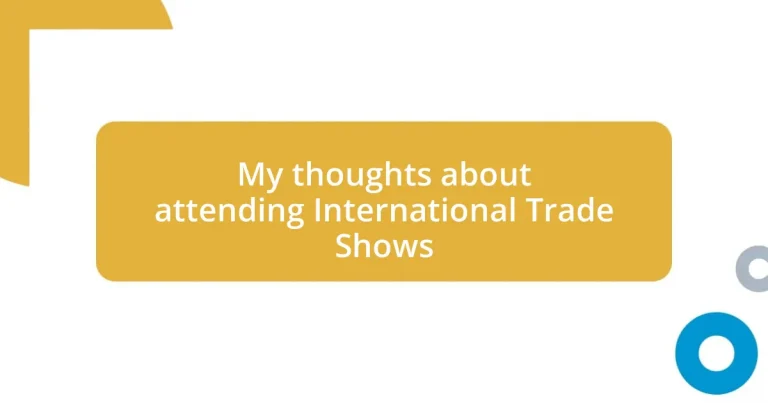Key takeaways:
- International trade shows are crucial for expanding business networks and boosting brand visibility, often resulting from powerful first encounters.
- Preparation and strategic selection of trade shows based on clear objectives and relevant exhibitors enhance the overall experience and outcomes.
- Active engagement, such as scheduling meetings and participating in discussions, is essential for maximizing networking opportunities at trade shows.
- Timely and personalized follow-ups after the event can transform fleeting connections into valuable, ongoing relationships.
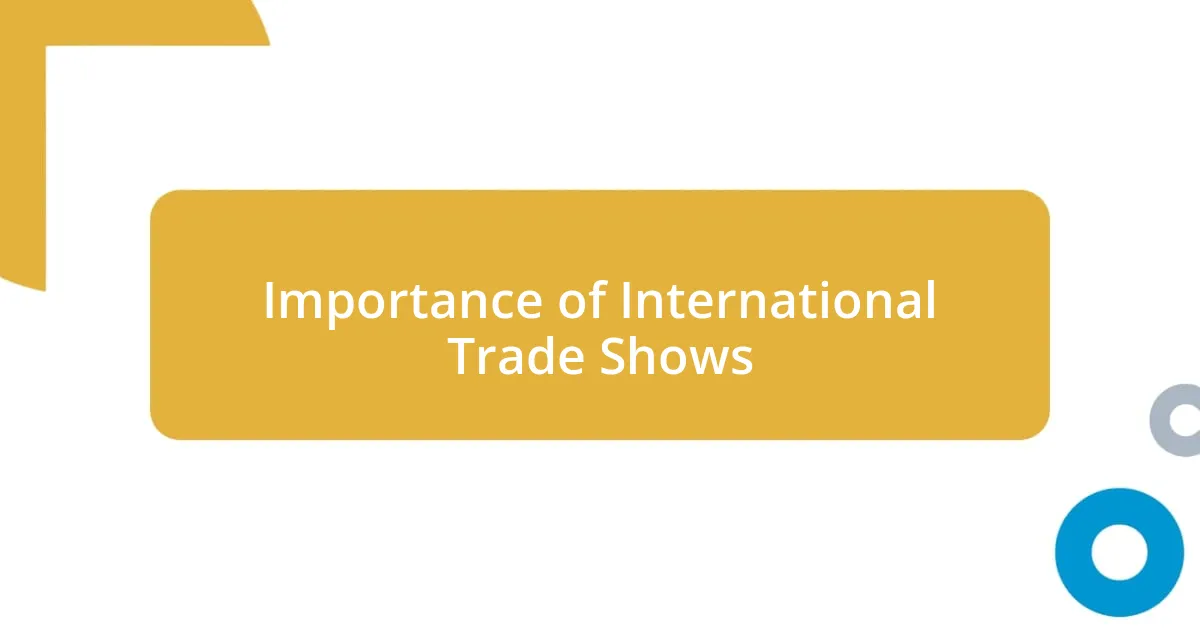
Importance of International Trade Shows
International trade shows play a pivotal role in expanding business networks. I remember my first trade show; it was overwhelming yet exhilarating. Being surrounded by industry leaders and potential partners makes you realize just how many opportunities are waiting just outside your office door.
The diversity of perspectives at these events is invaluable. Each booth I visited represented not just a product but a story from a different part of the world. It made me question how many innovative ideas are lost simply because we don’t take the time to connect across borders.
Moreover, attending international trade shows significantly boosts brand visibility. I still recall the moment my company’s product caught the eye of a major distributor. That single encounter transformed our business trajectory. Isn’t it fascinating how one conversation can open the door to untold possibilities?
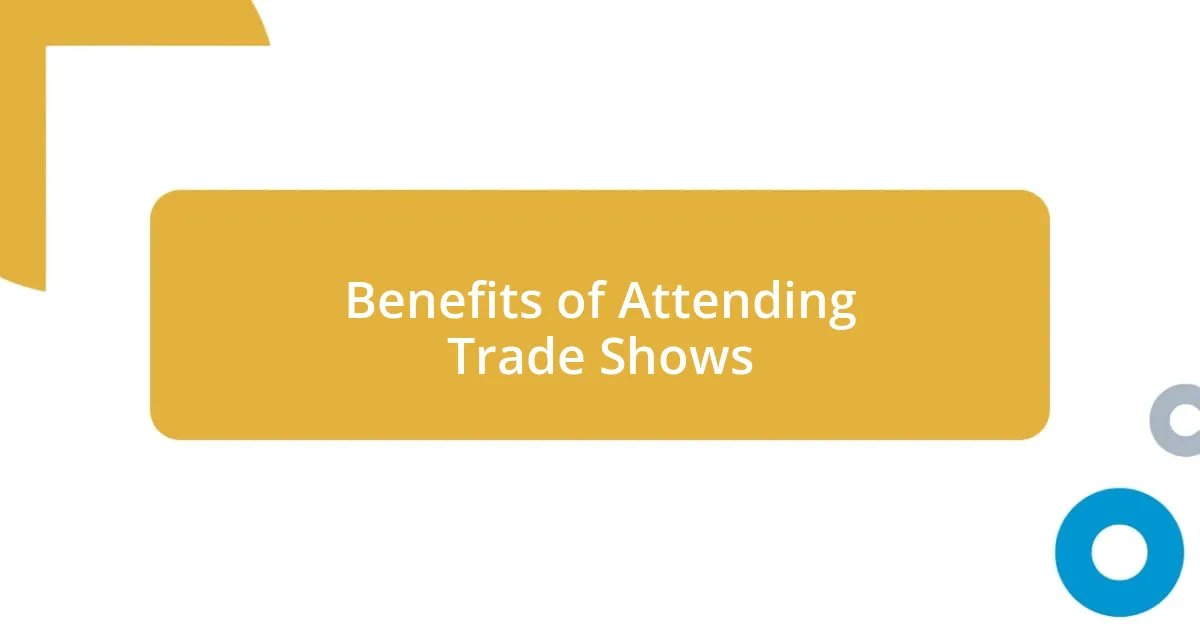
Benefits of Attending Trade Shows
Attending trade shows offers a unique chance to stay ahead of market trends. I vividly remember standing in front of a competitor’s booth, absorbing their latest innovations and gauging potential shifts in consumer demand. It dawned on me how crucial it is to be present, as these insights can shape not only my strategies but also the future of my business. Plus, there’s something electrifying about being in the same space as industry pioneers, exchanging thoughts and spotting gaps in the market.
Here are some notable benefits of attending trade shows:
- Networking Opportunities: Connect personally with key players, suppliers, and potential partners, building relationships that can flourish beyond the event.
- Market Insights: Gain firsthand knowledge of emerging trends and consumer preferences through demonstrations and discussions.
- Brand Exposure: Showcase your products to a diverse audience, elevating your brand’s presence in a crowded marketplace.
- Competitive Analysis: Learn from competitors by observing their offerings and tactics, allowing you to refine your own strategy.
- Educational Sessions: Participate in workshops and panels that provide valuable knowledge and skills relevant to your industry.
Each benefit amplifies the importance of stepping outside our usual routines and immersing ourselves in the vibrant atmosphere of trade shows. The experience can be transformative, both personally and professionally.
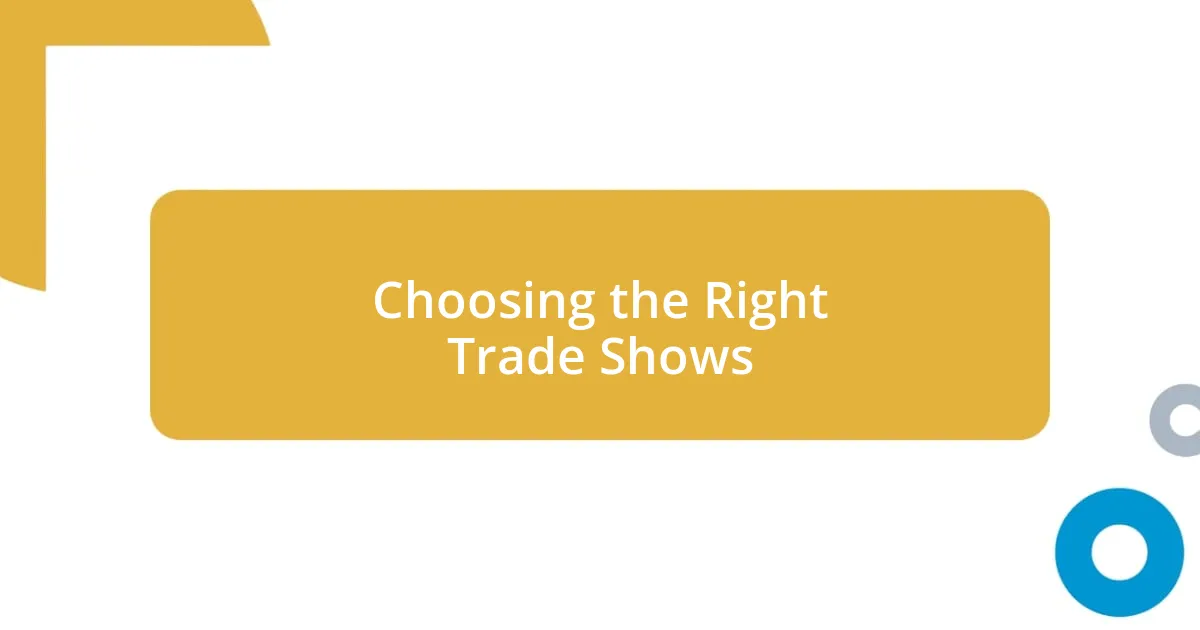
Choosing the Right Trade Shows
When it comes to choosing the right trade shows, I often reflect on what my goals are for attending. For instance, are you looking to expand your network, or are you more focused on learning about industry innovations? Evaluating your objectives can guide you to select events that align with your business needs. I’ve found that attending trade shows with a clear purpose maximizes the value of the experience.
Another crucial aspect is the geographic location of the trade shows. Personally, I’ve experienced events on both coasts of the U.S., and the atmosphere can drastically differ. Trade shows in metropolitan areas tend to attract a larger, more diverse crowd, while regional shows might provide a more intimate setting. This distinction has helped me cultivate varying strategies depending on where I exhibit, leading to different opportunities in audience engagement.
Lastly, I can’t stress enough the importance of researching the exhibitors and keynote speakers. There have been occasions when I attended shows without checking the line-up, only to find that the content was not relevant to my business. I learned a valuable lesson there: knowing who’s involved helps ensure that I’m investing time and resources into an event that truly matters to me. The excitement of discovering the right show is as important as the event itself!
| Criteria | Considerations |
|---|---|
| Objectives | Define clear goals: networking, learning, or showcasing products. |
| Location | Choose between larger metropolitan areas or smaller, regional venues for different experiences. |
| Exhibitors/Speakers | Research attendees to ensure relevance and maximize value. |
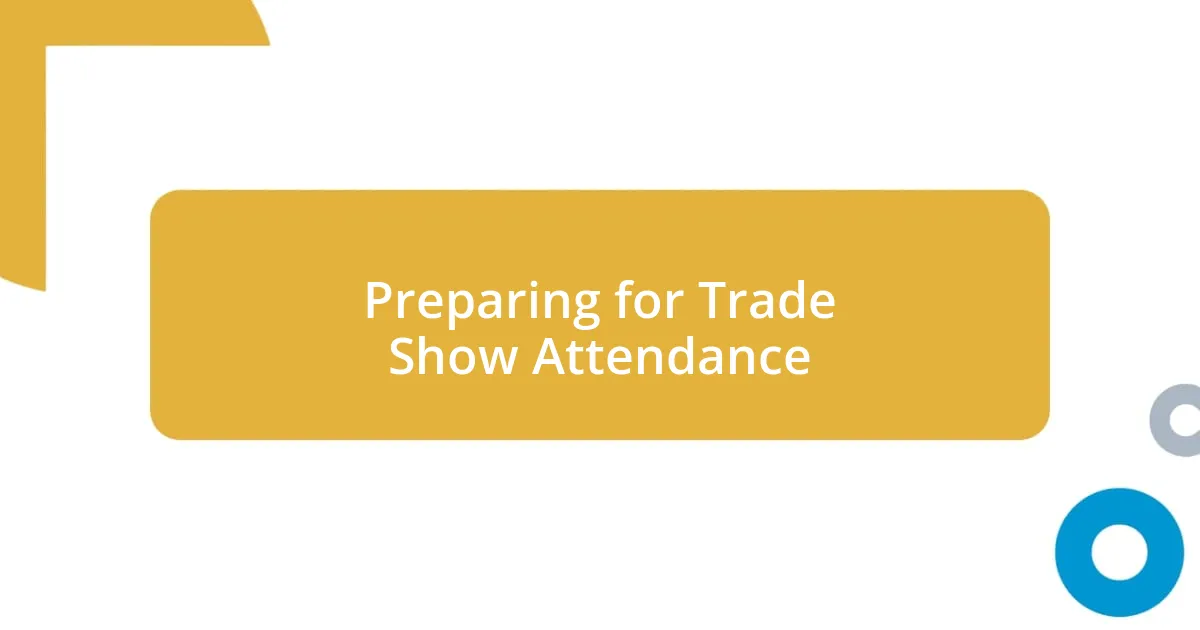
Preparing for Trade Show Attendance
Preparing for trade show attendance is an exciting venture, but I’ve learned through experience that it requires careful planning. One year, I found myself scrambling to organize travel and accommodations just a week before the event, which led to unnecessary stress. Trust me, having your logistics sorted well in advance lets you focus on making the most of the opportunities at the show.
As I prepare for an upcoming trade show, I make a checklist of essential items to pack, including marketing materials, business cards, and even a portable charger. I remember the time I forgot my business cards—I spent the whole event networking with an awkward mix of handwritten notes and phone scribbles. Having everything ready not only boosts your confidence but ensures that you’re putting your best foot forward when meeting potential partners and clients.
I also find it helpful to connect with other attendees before the event. A simple post on social media or a message in industry forums can create buzz and foster connections. There’s something energizing about knowing you’ll meet familiar faces among the crowd. I often ask myself, who else will be there, and how can we collaborate? Building these relationships beforehand gives me a sense of community that makes the event more enjoyable and productive.
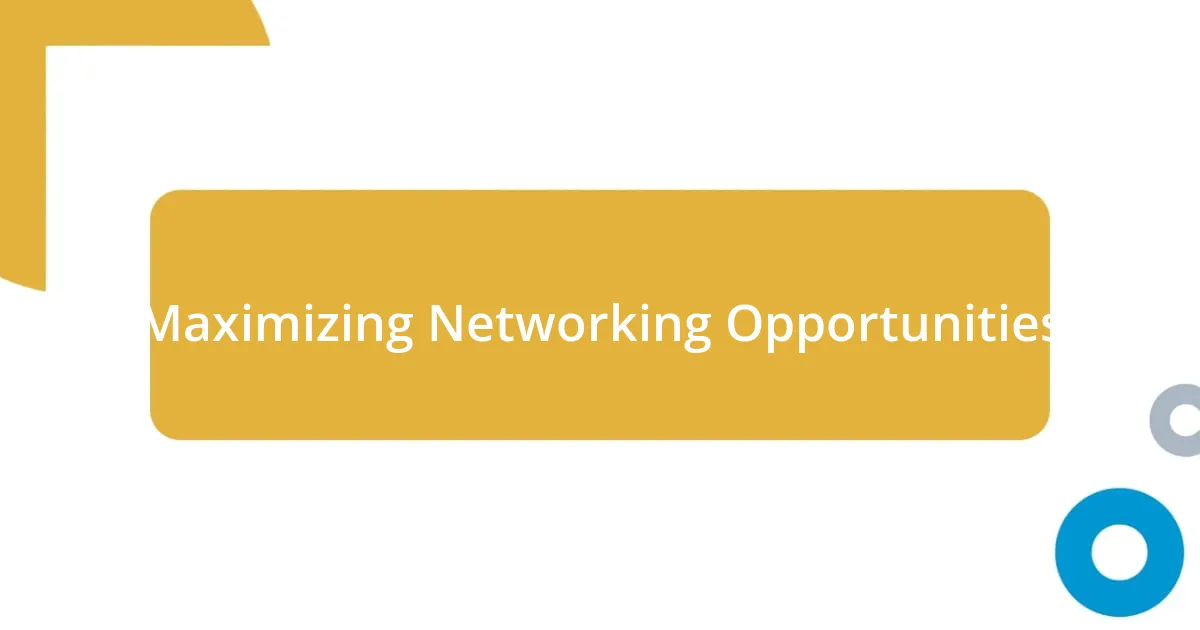
Maximizing Networking Opportunities
Maximizing networking opportunities at trade shows is often about being proactive. I distinctly remember a time when I made it a point to schedule one-on-one meetings ahead of the event. I reached out through LinkedIn and set up coffee chats, which created a more meaningful connection than the usual small talk at the booths. Isn’t it amazing how a planned conversation can lead to uncovering shared interests or potential collaborations?
During the event, I make it a priority to engage in discussions rather than stick to just exchanging business cards. I recall a fascinating conversation I had with a fellow attendee about sustainability practices in our industry. By taking a genuine interest in others’ perspectives, I not only gained valuable insights but also left a lasting impression. How often do we underestimate the power of just listening?
Lastly, participating in workshops or panel discussions allows for organic networking opportunities. I find that these settings often lead to deeper conversations with like-minded individuals who share similar passions. When I ask a question during a session, it’s incredible to see others approach me afterward, eager to chat further. This active engagement transforms both my experience and the connections I make into something significant beyond the surface level.
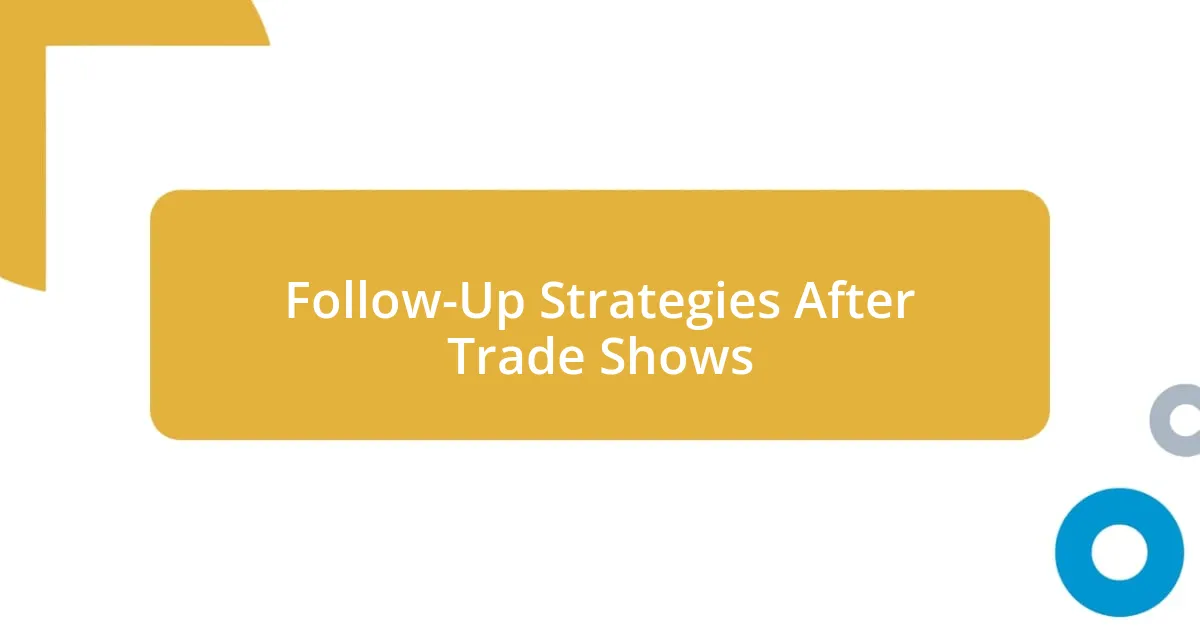
Follow-Up Strategies After Trade Shows
After the whirlwind of a trade show, I find that timely follow-ups are crucial for transforming fleeting connections into lasting relationships. One year, I made it a point to send personalized emails to everyone I met within a week. I crafted each message by recalling specific points from our conversations, which made recipients feel valued. Isn’t it astounding how a little thoughtful detail can spark renewed interest and strengthen connections?
Another strategy is to leverage social media. I’ve often shared photos from the event along with key takeaways via my platforms, tagging individuals I spoke to. It’s a simple yet effective way to keep the conversation going while drawing attention to their contributions as well. Have you noticed how a shared experience can reignite an initial interest in working together?
Lastly, I recommend creating a follow-up plan that includes not just emails, but also reminders for future meetings or calls. After one trade show, I scheduled quarterly check-ins with several contacts I wanted to nurture further. This proactive approach has led to fruitful collaborations that I didn’t initially foresee. How often do we let opportunities slip by simply because we forget to follow up? Taking that extra step can often yield incredible returns.
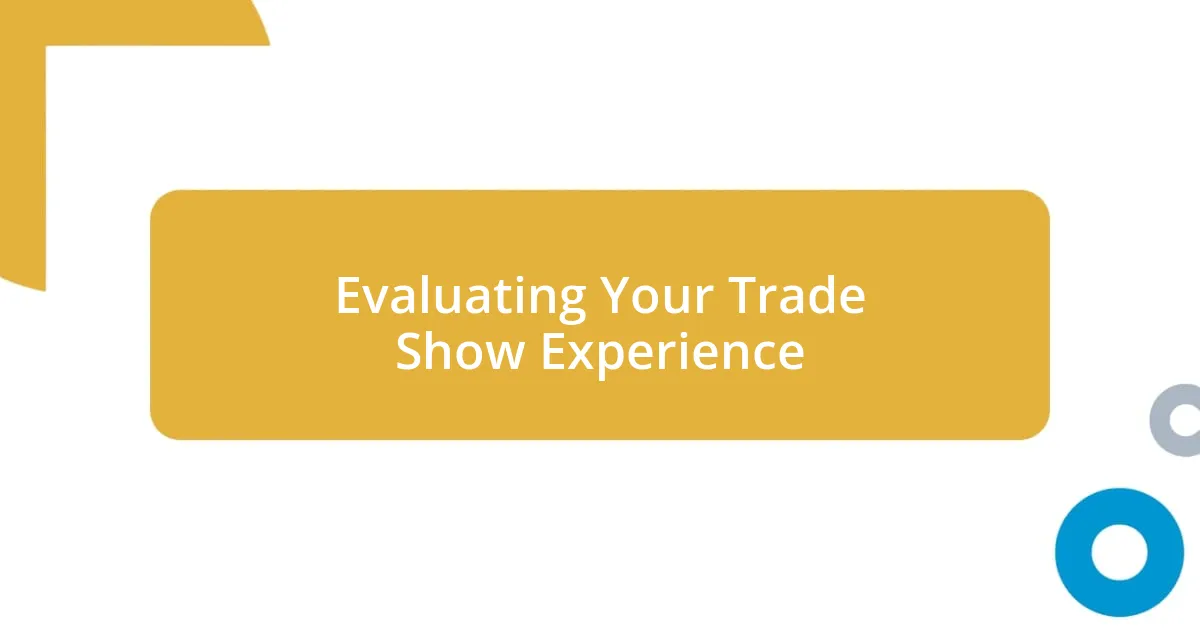
Evaluating Your Trade Show Experience
When I reflect on my trade show experiences, I focus on what truly resonated with me. After one particularly vibrant show, I took a moment to jot down my impressions, including the sessions that sparked my curiosity or the products that impressed me. I ask myself, what specific moments stood out? This practice helps me distill the experience into actionable insights and ensure that the energy I felt during the event translates into meaningful actions afterward.
Evaluating the quality of interactions I’ve had at trade shows is equally important. I often revisit the conversations I found most impactful and think about why they were special. Was it the chemistry between us, or perhaps a shared vision? Realizing how certain dialogues ignited passion within me encourages me to seek out similar connections in the future. Don’t you find it fascinating how some brief encounters can lead to major shifts in perspective?
It’s also beneficial to assess the overall value derived from attending these events. I remember one occasion when I left a trade show with a handful of intriguing contacts but also a sense of clarity regarding my business goals. Reflecting on what I learned and how I can apply that knowledge helps solidify the experience in my mind. Have you ever wondered how a single event can shape your thinking in ways you never expected? Recognizing these shifts empowers me to navigate the next trade show with intention and purpose.












